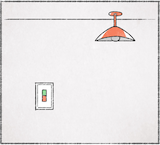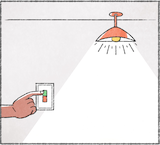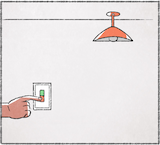


นี้คืออี่หยัง นี้คือหลอดไฟ
หลอดไฟอันใหญ่บ่ บ่ หลอดไฟอันบ่ใหญ่ หลอดไฟอันน้อยๆ
หลอดไฟติดอยู่ใส หลอดไฟติดอยู่เทิงเพดานบ้าน
ขั้นมีหลอดไฟแล้ว มันต้องมีสะวิดเปิดไฟนำบ่ มีอยู่ ต้องมีสะวิดเปิดไฟพ้อม
แล้วสะวิดเปิดไฟติดอยู่ใส สะวิดเปิดไฟติดอยู่ข้างฝาบ้าน หลือข้างกำแพงบ้าน
7
เขากำลังเฮ็ดหญัง เขากำลังเปิดไฟ เขาใซ้มือของเขาเด่ไปเปิดสะวิดไฟ
ขั้นบ่เอามือไปเปิดสะวิดไฟ ไฟกะสิบ่ติด ไฟกะสิบ่เห็นฮุ่ง
ตอนนี้ไฟมันฮุ่งบ่ ฮุ่งอยู่ ตอนนี้ไฟมันฮุ่ง ไฟมันฮุ่งบักคัก
แล้วเป็นหญังไฟมันคือฮุ่ง มีคนไปเปิดไฟ ไฟมันกะเลยฮุ่ง ไฟมันกะเลยให้แสงสะหว่าง
ขั้นเฮาเปิดไฟ มันต้องใซ้ไฟฟ้าบ่ ใซ้อยู่ มันต้องใซ้ไฟฟ้าพ้อม
ขั้นเฮาเปิดไฟ มันต้องใซ้ไฟฟ้า มันต้องใซ้พะลังงานไฟฟ้า
ขั้นเฮาเปิดไฟเบิดมื้อเบิดค่ำ มันกะสิเปียงไฟ มันกะสิใซ้ไฟฟ้าหลาย
8
เขากำลังเฮ็ดหญัง เขากำลังปิดไฟ
เขาใซ้นิ้วของเขาเด่ไปเปิดไฟ เขาใซ้นิ้วของเขาเด่ไปปิดไฟตงปุ่มสะวิดสีแดง
พอเขากดปิดสะวิดไฟแล้ว ไฟมันกะสิดับ ไฟมันกะสิบ่เห็นฮุ่ง
ขั้นเขาปิดไฟแล้ว มันสิมืดบ่ มืดอยู่ ขั้นเขาปิดไฟแล้ว มันกะสิมืด มันกะสิบ่เห็นฮุ่ง มันกะสิบ่มีแสงสะหว่างเลย
ตอนนี้มันเห็นฮุ่งบ่ บ่ มันบ่เห็นฮุ่ง มันมืด มันเลยบ่เห็นฮุ่ง
เป็นหญังเขาคือปิดไฟ บ่ลู้คือกัน เขาอาดสินอน หลืออาดสิออกจากบ้านแล้วกะได้ เขากะเลยปิดไฟ เพื่อที่สิบ่ได้ใซ้พะลังงานไฟ แล้วมันกะสิเฮ็ดให้บ่เปียงไฟกะได้
Link to overview page
Link to dictionary
| Isaan | Pronunciation | Tones | Thai | English/Notes |
|---|---|---|---|---|
| นี้ | ni: | HF | นี้ | 1. this 2. here |
| คือ | khʉ: | HR | คือ | 1. to be, to resemble, like, as 2. why {บักหล้าคือบ่เก็บโต่ะแน่ = [addressing a young boy] Why haven't you cleared the table?} |
| อี่หยัง | i:-yaŋ | H-M | อะไร | 1. what {นี้คืออี่หยัง = What is this?} {มื้อนี้เจ้าเฮ็ดอี่หยัง = What are you doing today?} {กินเข้างายกับอี่หยัง = What did you have for breakfast?} 2. something, anything, (in negations) nothing {บ่ต้องเฮ็ดอี่หยังอีกเลยนอกจากใส่ปุย = [we] don't need to do anything besides adding fertilizer} |
| หลอด | lɔ:t | LF | หลอด | 1. tube 2. drinking straw 3. clf. for tubes (e.g., toothpaste, neon tube), drinking straws |
| ไฟ | fai | HR | ไฟ | 1. fire, flame 2. electricity, power 3. light |
| อัน | an | M | อัน | 1. thing, object 2. general clf. for objects |
| ใหญ่ | ɲai | H | ใหญ่ | large, big |
| บ่ | bɔ: | H | ไม่ | 1. no, not 2. question particle, transforming a statement into a question Notes: spelling exception in line with common usage on social media |
| น้อย | nɔ:i | HF | น้อย | 1. few, little 2. small |
| ติด | tit | M | ติด | 1. to be attached to, to be on/at {สะวิดเปิดไฟติดอยู่ข้างฝาบ้าน = the light switch is on the wall} {มันสิมีน้ำติดอยู่โตของเขา = there is water on his body} 2. to stick (to), to attach (to) |
| อยู่ | yu: | H | อยู่ | 1. to be (located) at 2. yet, still 3. auxiliary indicating continuous or progressive action {ทอดปาอยู่ในกะทะ = (in the process of) frying a fish in the pan} {แม่กำลังเมี้ยนเฮียนอยู่ = mother is cleaning/tidying up the house} |
| ใส | sai | M | (ที่)ไหน | 1. where? {สิไปใส = Where are [you] going?} {มาแต่ใส = Where are [you] coming from?} {กะทะอยู่ใส = Where's the pan?} 2. somewhere, anywhere {ใสกะได้ = anywhere, wherever you like} |
| เทิง | thə:ŋ | HR | บน | 1. on, on top of, at, in {เทิงโต่ะ = at/on the table} {กบมันนั่งอยู่เทิงใบบัว = the frog is sitting on the lotus leaf} {เทิงท้องฟ้า = in the sky} {มันแล่นอยู่เทิงลาง = [the train] runs on rails} {มีคนนั่งอยู่เทิงลดสามล้อสามคน = there are three people sitting in the tuk tuk} 2. up, upward Notes: pronunciation: also realized as ทัง |
| เพดาน | phe:-da:n | HR-M | เพดาน | ceiling |
| บ้าน | ba:n | HF | บ้าน | 1. house, home 2. village (also used as a prefix before the name of a village) 3. home country, home region {บ้านเฮาเฮ็ดเข้าจั่งใด = How do we plant rice in Isaan/Thailand?} |
| ขั้น | khan | LF | เมื่อ | when, if |
| มี | mi: | HR | มี | 1. to have 2. there is |
| แล้ว | lɛ:o | HF | แล้ว | 1. finished 2. already 3. and then, and next (especially แล้วกะ) 4. auxiliary for past tense |
| มัน | man | HR | มัน | it (also used to refer to people) |
| ต้อง | tɔŋ | HF | ต้อง | to have to, must |
| สะวิด | sa-wit | M-H | สวิตช์ | switch (e.g., light switch) |
| เปิด | pə:t | M | เปิด | 1. to open {เปิดหน้าต่าง = to open the window} {เปิดปะตู = to open the door} 2. to start, to switch on {เปิดไฟ = to switch on the light} {เปิดแอ = to switch on the A/C} |
| นำ | nam | HR | 1. at, in 2. with, together with {บ่สามาดถือไปนำได้ = [you] can't carry it around} {กินบักแตงโมนำเฮาบ่ = Will you eat watermelon with me?} 3. to lead, to accompany, to go with {เด็กน้อยญ่างไปนำแม่ = the daughter follows her mother} |
|
| พ้อม | phɔ:m | HF | พร้อม | at the same time, also, too {มีตะเว็นพ้อม = the sun's out, too} {กะทะมีด้ามพ้อม = the pan has also a handle} |
| ข้าง | kha:ŋ | LF | ข้าง | 1. side {มีหูจับสองข้าง = there are handles on both sides} 2. next to {วางอยู่ข้างๆ ก่องใบใหญ่ = it's placed next to the large box} {เขายืนอยู่ข้างๆ อีกพุหนึ่ง = he's standing next to another person} 3. clf. for body parts which come in pairs (eyes, ears, legs etc.) {เขามีตาสองข้าง = she has two eyes} |
| ฝา | fa: | M | ฝา | 1. lid {ฝากะปุก = lid of a jar/pot} 2. wall {ฝาบ้าน = wall (of a house) = กำแพงบ้าน} |
| หลือ | lʉ: | M | หรือ | or |
| กำแพง | gam-phɛ:ŋ | M-HR | กำแพง | wall |
| เขา | khao | M | เขา | personal pronoun: he, she |
| กำลัง | gam-laŋ | M-HR | กำลัง | auxiliary indicating continuous or progressive action |
| เฮ็ด | het | H | ทำ | to do, to make |
| หญัง | ɲaŋ | M | อะไร, เป็นหญัง = ทำไม | 1. what {เขากำลังเฮ็ดหญัง = What is he doing?} {ธูปเอาไว้เฮ็ดหญัง = What are incense sticks for?} 2. something, anything, (nothing) 3. เป็นหญัง[...]คือ in initial position: why {เป็นหญังเขาคือใส่บักพิกลงไปในกวยเตียว = Why is he putting chili in [his] noodle soup?} {เป็นหญังหน้าต่างมันคือเปิด = Why is the window open?} {เป็นหญังมันคือมีควนไฟ = Why is there smoke?} |
| ใซ้ | sai | HF | ใช้ | to use |
| มือ | mʉ: | HR | มือ | 1. hand 2. front leg/paw (e.g., of a cat) |
| ของ | khɔ:ŋ | M | ของ | of, belonging to |
| เด่ | de: | H | to stretch forward, to extend forward | |
| ไป | pai | M | ไป | 1. to go 2. auxiliary indicating action extending into the future |
| เอา | ao | M | เอา | to take, to give {เขากำลังเอาก่องไปซั่ง = he's taking the boxes to weigh them} {หมอกำลังเอายาให้คนป่วยกิน = the doctor is giving medicine to the patient} {เอาไว้ถ้า = is for, is used for, has the purpose of} |
| กะ | ga | M | ก็ | 1. then, consequently 2. also |
| สิ | si | M | จะ | future tense auxiliary {เขากำลังสิตื่น = he's about to wake up} {สิไปตะหลาด = [I'm] going to the market} |
| ติด | tit | M | ติด | to light, to ignite {ขั้นบ่กดปุ่ม มันกะบ่ติด = [of a device or appliance] if you don't press the button, it won't start} |
| เห็น | hen | M | เห็น | to see |
| ฮุ่ง | huŋ | H | 1. light (adj), bright 2. to have light, to be not dark |
|
| ตอนนี้ | tɔ:n-ni: | M-HF | ตอนนี้ | now |
| บักคัก | bak-khak | M-H | intensifier: very, very much (variant of คัก) | |
| เป็น | pen | M | เป็น | 1. to be, to exist 2. to be able to 3. to suffer, sth. happens to 4. เป็นหญัง[...]คือ in initial position: why? {เป็นหญังเขากะคือแปงฟัน = Why is he brushing his teeth?} {เป็นหญังเคี่ยงบินมันคือสิตก = Why is the airplane falling down?} |
| คน | khon | HR | คน | person, people |
| เลย | lə:i | HR | เลย | 1. futher on, beyond, past {เข็มน้อยเลยเลขสิบสองไป = the minute hand has passed number twelve} 2. too much 3. at all 4. definitively 5. completely, utterly |
| ให้ | hai | LF | ให้ | 1. to give {หมอกำลังเอายาให้คนป่วยกิน = the doctor is giving the patient medicine} 2. for 3. to allow, to be allowed |
| แสง | sɛ:ŋ | M | แสง | light |
| สะหว่าง | sa-wa:ŋ | M-H | สว่าง | bright, shining |
| เฮา | hao | HR | เรา | 1. personal pronoun: we 2. personal pronoun: I |
| ไฟฟ้า | fai-fa: | HR-HF | ไฟฟ้า | electricity |
| พะลังงาน | pha-laŋ-ŋa:n | H-HR-HR | พลังงาน | energy {พะลังงานไฟฟ้า = electrical energy} |
| เบิดมื้อเบิดค่ำ | bət-mʉ:-bət-kham | M-HF-M-H | ทั้งวันทั้งคืน | [all] day and night, around the clock |
| เปียง | pi:aŋ | M | เปลือง | to waste |
| หลาย | la:i | M | เยอะ, มาก | many, much, very |
| ปิด | pit | M | ปิด | 1. to close {ปิดปะตู = to close the door} {ปิดก่อกน้ำ = to close the tap} 2. to finish, to switch off {ปิดไฟ = to switch off the light} {ปิดวิทะยุ = to switch off the radio} |
| นิ้ว | niu | HF | นิ้ว | 1. finger 2. toe |
| ตง | toŋ | M | ตรง | 1. at 2. to be precise at, to be exact {ห้าโมงตง = exactly five o'clock} 3. straight |
| ปุ่ม | pum | H | ปุ่ม | button |
| สี | si: | M | สี | 1. color 2. colored pencil, crayon |
| แดง | dɛ:ŋ | M | แดง | red |
| พอ | phɔ: | HR | พอ | 1. just when, just after, as soon as 2. enough, adequate |
| กด | got | M | กด | 1. to push, to press (down) {กดปุ่ม = to push a button} 2. to withdraw [money] {กดเงิน = to withdraw money} |
| ดับ | dap | M | ดับ | 1. inactive, out (light, electronic device) 2. to extinguish (e.g., a fire, smell etc.) {ดับไฟ = to extinguish a fire} {ลดดับเพิง = fire truck} |
| มืด | mʉ:t | HF | มืด | dark |
| ลู้ | lu: | HF | รู้ | 1. to know 2. to understand Notes: equivalent to ฮู้ |
| คือกัน | khʉ:-gan | HR-M | เหมือนกัน | 1. also, likewise, similarly {ยินดีที่ได้ฮู้จักคือกันคับ = Nice to meet you too!} 2. in negative sentences: either {บ่ลู้คือกัน = I don't know either} {จักคือกัน = I don't know (either)} |
| อาด | a:t | LF | อาจ | 1. might, may, will 2. likely |
| นอน | nɔ:n | HR | นอน | 1. to lie down 2. to sleep |
| ออก | ɔ:k | LF | ออก | 1. to go out, to leave 2. out |
| จาก | ja:k | LF | จาก | 1. from {... เฮ็ดมาจากอี่หยัง = ... is made from what?} 2. to depart |
| ได้ | dai | HF | ได้ | 1. can 2. to get, to obtain 3. before verb: indicating past tense 4. บ่ได้ + verb: not |
| เพื่อที่ | phʉ:a-thi: | H-H | เพื่อที่ | in order to, so that Notes: the vowel เอือ is likely to be a Thai loan |